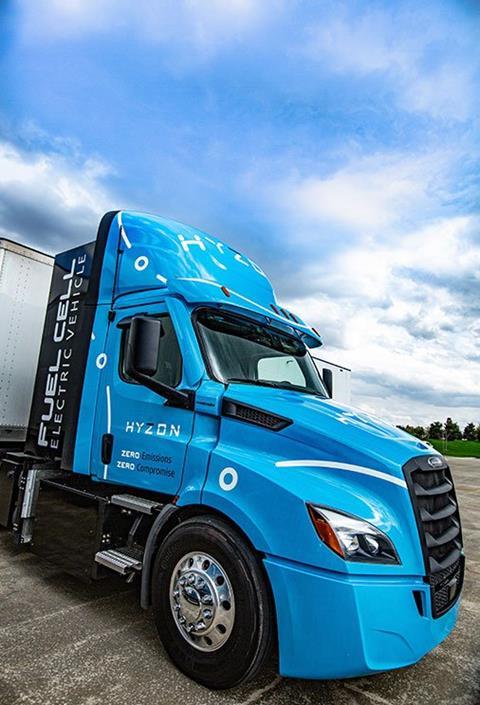Hyzon has announced the completion of the first customer demo trials of its hydrogen fuel cell electric vehicle powered by liquid hydrogen.
US start-up truck builder Hyzon has announced it has completed the first customer feasibility trials with a fuel cell-powered truck using liquid hydrogen. Liquid hydrogen, as opposed to the high-pressure gaseous hydrogen currently being trialled on trucks, has the advantage of a higher energy density, offering increased range.

The customer trial with food distribution company Performance Food Group saw the truck complete deliveries to eight customers, travelling over 540 miles on a 16-hour continuous run. “With increased range and no added weight in comparison to our gaseous hydrogen trucks, we believe this liquid hydrogen demo run has demonstrated potential viability for the future of liquid hydrogen in commercial trucking,” said Hyzon Chief Executive Officer Parker Meeks. “The results we captured in the strenuous demo through Central Texas’s diverse terrain and summer heat make us optimistic that, once commercialised, our liquid hydrogen vehicle powered by our proprietary 200kW fuel cell system should be able to provide long distance range between 650 and 800 miles, on par with many diesel truck range requirements.”
Compared to gaseous hydrogen, the current industry standard, liquid hydrogen allows Hyzon to increase the amount of fuel on board significantly thanks to increased energy density, with no changes to vehicle weight or payload, says Hyzon. To maintain the energy-dense liquid state, hydrogen requires cold temperatures of -200degC. In 2021 Hyzon announced a partnership with Chart Industries to develop a tank system capable of storing liquid hydrogen at extremely cold temperatures and delivering it to the fuel cell system at the necessary pressure.
“This is a meaningful accomplishment for the hydrogen ecosystem, as long-haul and heavy duty transportation is a key end-use for liquid hydrogen,” stated Jill Evanko, Chart’s CEO and President. “Our investment in our unique cryogenic liquid hydrogen onboard tank and our liquid hydrogen test facility support progress in the hydrogen industry, with the Hyzon and PFG road demonstration another key step in the evolution of hydrogen commercialisation.”
According to research released last year by the Argonne National Laboratory in Lemont, iquid hydrogen as a fuel source has been estimated to be up to $5 per kilogram less expensive all-in to dispense than high-pressure gaseous hydrogen, which would provide meaningful benefits to fleet owners. “Simply put, we see liquid hydrogen as the economical approach to long range zero emission trucking,” Meeks added.













